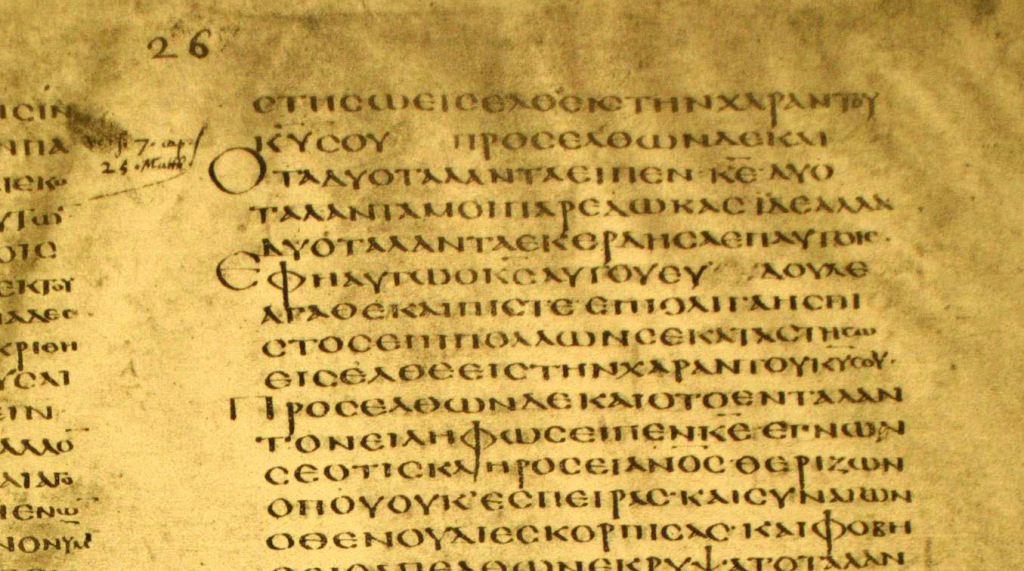
I recently presented a lecture to a group of students and others in Canada about the Orthodox understanding of Scripture. In this lecture, which is available here, I spoke about the fact that the New Testament and the early Church used a version of the Old Testament Scriptures which was a translation into the Greek language made by the Jews in the centuries before Christ. We know this translation as the Septuagint, or the Seventy, because of the tradition that the Pentateuch at least (the first five books of the Old Testament) was translated by Seventy Jewish scholars. By about 135 BC the other sacred writings had also been translated into Greek, or in some cases were written in Greek. This is often very different in meaning to the version of the Old Testament Scriptures which the Jews of Palestine started to adopt as authoritative in the centuries after Christ, and which was finally formalised in about 1000 AD. It was this alternative edition which Protestant translators, teachers and preachers, have depended on, and which has come to be even the usual text in Orthodox Churches, but it is not the text that Orthodox ever used until recent centuries, though it found its way into the Western Church through the translation of the Jewish text made by Jerome in the very late 4th century slowly eroded the use of the Septuagint in the Roman Church.
In the New Testament the Septuagint edition of the Old Testament was quoted 340 times. It was the translation and version of the Old Testament Scriptures that our Lord Jesus and the Apostles used when they referred to the Scriptures. And it was the version of the Old Testament that was translated into Coptic, Armenian, and even into Latin. The Fathers of the Church used this edition, and it was, above all others, the Orthodox Old Testament.
In Matthew 12:31, for instance, our Lord Jesus quotes from Isaiah 42:4. He says…
…in His name Gentiles will trust.
This is a clear prophecy of the universal character of the ministry of the one who will come and of whom Isaiah speaks. The problem is that in the Jewish/Protestant Old Testament the reference is not presented in this way. Isaiah 42:4 in the New King James version says…
…the coastlands shall wait for His law.
This is not really the same at all. Of course there is a connection between the two texts, but one is clearly speaking of the Gentiles finding faith in the one whom God will send, while the other speaks only of the coastlands and the Law. If we consider what the Septuagint says, that edition of the Old Testament that the New Testament and the Church have always used, we find that it is exactly as the Lord Jesus quoted and says..
He shall shine out, and shall not be discouraged, until he have set judgment on the earth: and in his name shall the Gentiles trust.
But there are other differences which are even more theologically significant. In Isaiah 53, for instance, v10 says in the New King James version, a Protestant translation based on the Jewish text…
What is this saying? It is that God has chosen to bring pain upon this suffering one whom Isaiah describes. This is certainly what most Protestants teach. Other modern Protestant translations of this verse, based on the later Jewish text, say…
The Lord was pleased To crush Him, putting Him to grief. (NASB)
But the Lord wanted to crush him and to make him suffer. (CEB)
Still, it’s what God had in mind all along, to crush him with pain. (MSG)
This entirely different translation based on a different text produces an entirely different understanding of salvation. In the Septuagint we see that God speaks as giving his Son for a dangerous mission, but in the Protestant translations based on the later Jewish text, we see that is is said that God himself is punishing and is the cause of the suffering of Christ. This is not the Christian teaching at all. These ideas are not found in the text that our Lord Jesus quotes. They are not found in the text that the Apostles used hundreds of times in the New Testament. They are not found in the Scriptures used by the Fathers or in the services of the Orthodox Churches.
This matters a very great deal. It is not too simplistic to say that a Protestant edition of the Old Testament, based on later Jewish texts, will quite naturally teach a Protestant understanding of Christianity. It is the Septuagint, the translation of the Old Testament made by the Jews into Greek some centuries before Christ, which preserves the authentic text which was received by the Orthodox and Apostolic Church, and which is the basis for the Orthodox and Apostolic understanding of the Faith.
